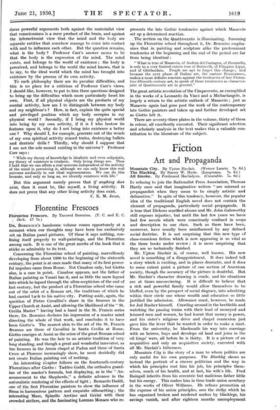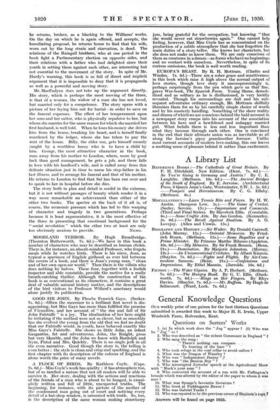Fiction
Art and Propaganda
IN refusing to join the Rationalist Press Association, Thomas Hardy once said that imaginative writers " are misread as propagandist when they mean to be simply artistic and delineative." In spite of this tendency, however, the popular idea of the traditional English novel does not contain the element of propaganda, particularly social propaganda. It is true that Dickens scarified abuses and Mr. John Galsworthy still exposes injustice, but until the last few years we have had few novels which were consciously confined in scope and description to one class. Such as there have been, moreover, have usually been uninfluenced by any defined social doctrine. It is not surprising that this new type of class-conscious fiction which is now appearing is so vital as the three books under review ; it is more surprising that they are so technically finished.
Mr. Upton Sinclair is, of course, well known. His new novel is something of a disappointment. It does indeed tell a story which is exciting, and in places dramatic, and it does to some extent paint a picture of one section of American society, though the accuracy of the picture is doubtful. But Mr. Sinclair's character drawing is crude, and his situations are at times unconvincing. It is difficult to believe that a rich and powerful family would allow themselves to be bluffed, even by the prospect of social disgrace, into admitting within their circle one whose wealth and education so little justified the admission. Allowance must, however, be made for Jed Rusher himself. Crawling around in the beetfields and watching the passing trains with their load of moneyed and leisured men and women, he had learnt that money is power, and his sister's religious drive and chapel connexion just gave him the lever that he wanted in order to make a start. From the university, he blackmails his way into marriage with an heiress, buys and develops oil land and joins in the oil kings' wars, all before he is thirty. It is a picture of an acquisitive and only an acquisitive society, executed with all Mr. Sinclair's bitterness.
Mountain City is the story of a man to whom politics are only useful for his own purposes. The Blackleg shows us instead the portrait of a sincere politician and the way in which his principles cost him his job, his principles them- selves, much of his health, and at last, his wife's life. Fred Raingall inherits from his eccentric but malicious father little but his energy. This makes him in time trade union secretary in the works of Oliver Williams. He refuses promotibn at the expense of his union principles, sees the strike which he has organized broken and rendered useless by blacklegs, his savings vanish, and after eighteen months unemployment he returns, broken, as a blackleg to the Williams' works. On the day on which he is again offered, and accepts,' the humiliating proposal, he returnS'hOme to find that his wife, worn out by the long strain and starvation, is dead. The relations of the Raingall -lirtithels, -who at. one period in the book fight a Parliamentary election on opposite sides, and their relations with a father who had delighted since their youth in setting them against each other, ire interesting but not essential to the movement of the story. In spite of Mr. Hardy's warning, this book is so' full of direct and 'implicit argument that it is impossible to deny that it is propaganda as well as a powerful and moving 'story.
Mr. MacFadyen does not take up the argument directly. His story, which is perhaps the most moving of the three, is that of a woman, the widow of a man she has not loved, but married only for a competence. The story opens with a picture of her laying him out for burial-in order to save on the funeral expenses. The effect of her temperament upon her sons and her suitor, who is physically repulsive to her, but whom she marries for the same reason for which she married her first husband, is well told. When he loses his money she drives him from the house, breaking his heart, and is herself finally murdered by the lodger, whom she has taken to pay the rent of the house. Billy, the elder son, gets himself meanly eaught by a worthless hussy who is to have a child by him. George, the most attractive character in the book, runs away from his mother to London, where, more by good luck than good management, he gets a job, and there falls in love with' his landlord's wife, and is called away from this delicate situation just in time to nurse his step-father in his last illness, and to arrange his funeral and that of his mother. He returns to London to find that Sal has been run over and to speak to her in hospital before she dies.
The story both in plan and detail is sordid in the extreme, but it is not without passages of beauty which render it in a way more remarkable an achievement than either of the other two books. The spectre at the back of it all is, of course, the economic pressure which has led to this warping of character and tragedy in two generations. Perhaps because it is least argumentative, it is the most effective of the three in presenting that emotional background for the " social revolution " which the other two at least are only too obviously anxious to provide. NEMO.









































 Previous page
Previous page